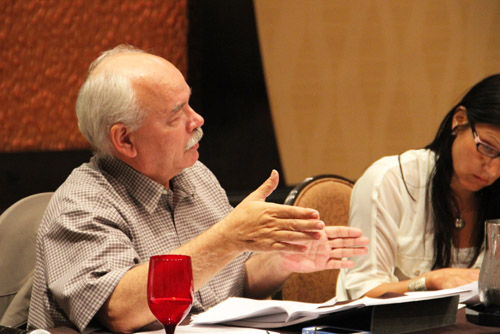
Niki Cleary, TulalipNews
At 62, short, grey and balding, Steve Gobin is not an imposing figure. He is humble, quiet, enjoys fly fishing and is devoted to his family. But ask him to talk about his tribe, economic development, sustainability, health care or any number of subjects connected to the wellbeing and longevity of his tribe, spark his passion, and Steve goes from mild mannered grandpa to razor sharp advocate in an instant.
After more than two decades of service for his tribe, Steve, General Manager of Tulalip’s Quil Ceda Village, is retiring. His career included labor in fisheries and forestry, 20 years of healthcare experience, work lobbying for expanded CHS (Contract Health Services) programs and funds, a stint in Governmental Affairs and finally his last two jobs, Deputy General Manager and General Manager of Quil Ceda Village. During his lifetime, he’s seen vast changes on the reservation, and he’s been a catalyst for some of them.
“I was born and raised here,” said Steve. “I think the tribe has gone through a lot of different personalities, but the leadership vision for the tribe has stayed consistent through those years. There’s still that consistency in the board today and I think that’s what kept us moving forward step after step after step.”
The tribe’s current prosperity is relatively new. Steve reminisced about his childhood.
“When I was a boy, we cut shakes for $3.00 a day, and we were happy to have the $3.00,” he explained. “We lived on a few thousand dollars a year. We lived on commodities, hunting and fishing. The priorities were making the family whole and feeding everybody.
“A lot of times I didn’t start school in the fall, I had to work and take care of my family,” Steve recalled. “My dad used to fish in Alaska, he used to start in June and go to November, so I got out of school early and started late. But I didn’t know I was poor.”
In his youth, Steve said, unemployment was about 80%. Then in the 1990s Tulalip built a bingo hall.
“The tribe didn’t even have an office until around 1965, and I think we had two or three employees, my mom was one of the employees they hired,” he said. “People didn’t fit in on the outside. There was no place for them to make money, the whole reservation economy was non-existent.”
Although there is always room for growth, Steve is grateful and astonished at what has been accomplished during his lifetime.
“It may seem to a lot of people that we don’t get paid enough, but look at what the tribe has given us, just in the last 20 years. It amazes me,” Steve described a few of the programs now provided. “We’ve funded healthcare, pharmaceuticals, mental health and drug and alcohol programs to help us overcome 200 years of poverty. We have money to pay per-capita payments to our people.
“No one needs to be starving or without a job. This is not the world that I knew growing up. It’s hard for me to look at my kids, even though I wanted them to have what I didn’t, and know they didn’t have the opportunity to experience living on the beach for food and to stay alive. Some of the bonding we did as a family and as a reservation, that really made us strong and we need to find a way to bring that back to our community.”
While some see addiction and social disorder as the pitfalls of prosperity, Steve says those dangers always existed. But now we have a chance to shape our future.
“The killer drug in 1970 was Rainier Beer,” he said. “Today it’s meth and heroin. But the things that stem from addiction are the same; child abuse, not feeling safe in the home, they’re the same now as then, but now there are more of us and it costs more to deal with it.
“But, with economic development,” Steve continued, “I think we have an opportunity to change the past and create a new vision for the future. Where kids don’t have to be hurt and people don’t have to go through those things. We can bring back some of that community pride to the tribe.
“A lot of what we’ve put into the ground, past Board of Directors, John McCoy, I can see it’s a future here, a future for my kids and grandkids and their kids. We’re building a sustainable economy so that our children don’t have to deal with the economic issues that we had. We’re the second largest employer in Snohomish County now. It’s been rewarding to be here.”
Right now, Steve can’t quite envision what the tribe will look like in a hundred years or more. But, family and culture, he described, have to be part of the future.
“I grew up and raised my family with the assumption that the reservation would always be a cultural center for our people,” he said. “But the sheer growth and population over the next 50 to 100 years is going to take that natural resource away from us. We’re going to have to find another way to be culturally connected to our past without fishing, hunting and the things that are the core of who we are. It’s going to be a challenge for our future leaders to take what’s best of the past and bring it forward to make a place for our people.”
Asked what teaching he’d like to leave for future generations, Steve said, “Take pride in yourself, work for your tribe’s future and the rewards that you will get will be enriching and last forever.”
Steve’s last day is July 1st. Like all of our leaders, I have no doubts that for the rest of his days, Steve will be looking out for the tribe and teaching future leaders what it means to be Tulalip. Happy retirement, Steve.
